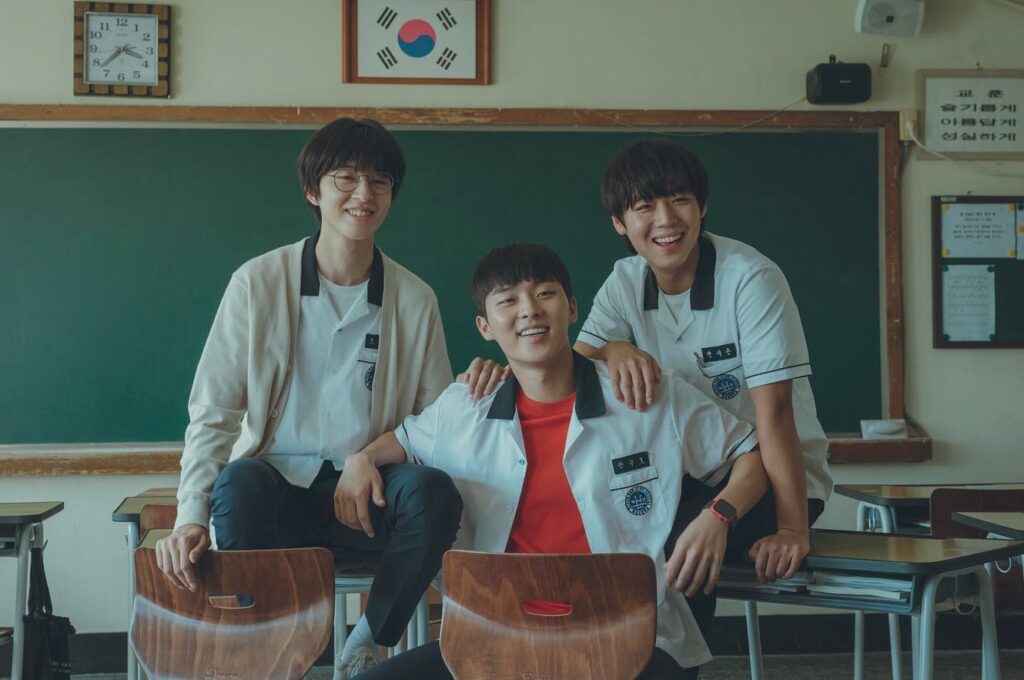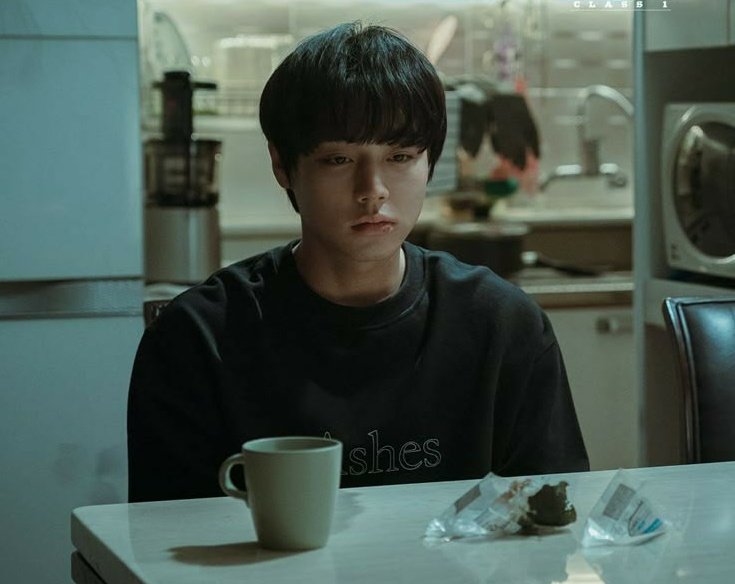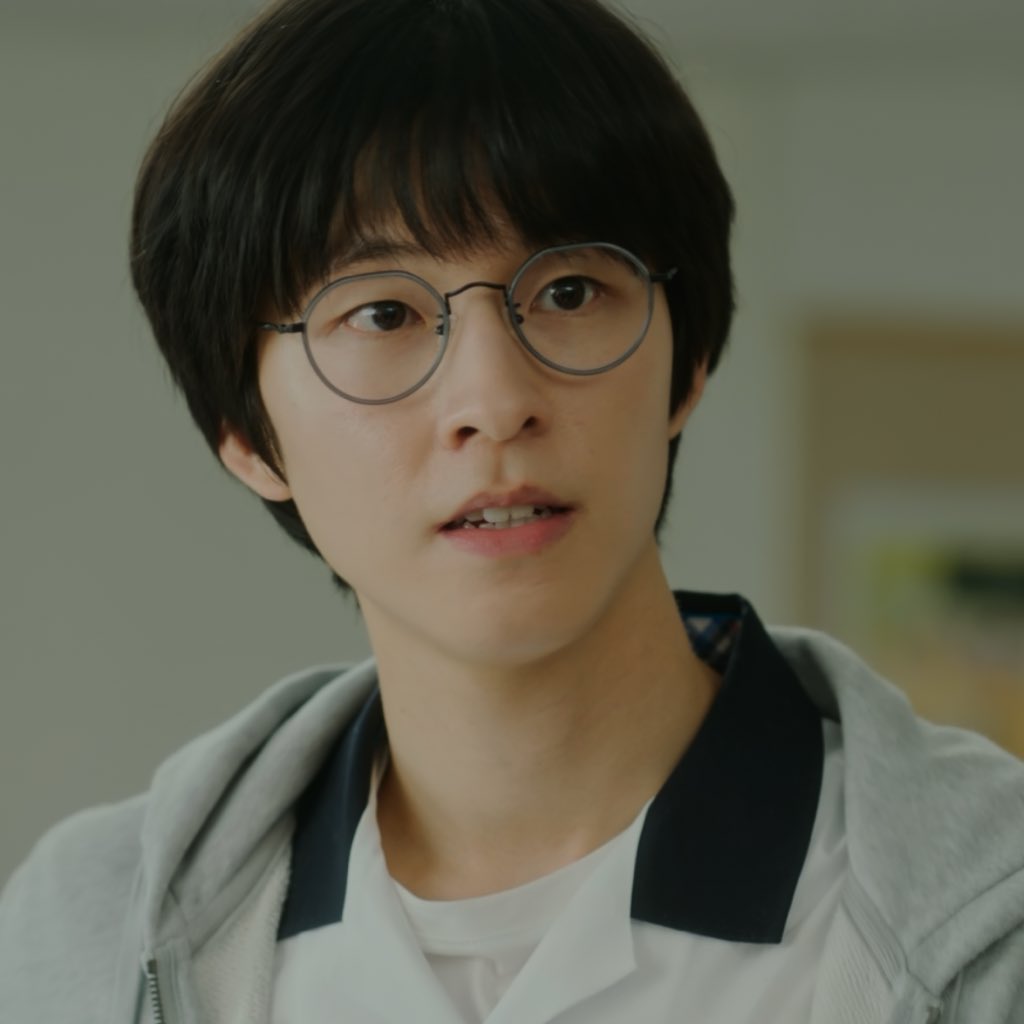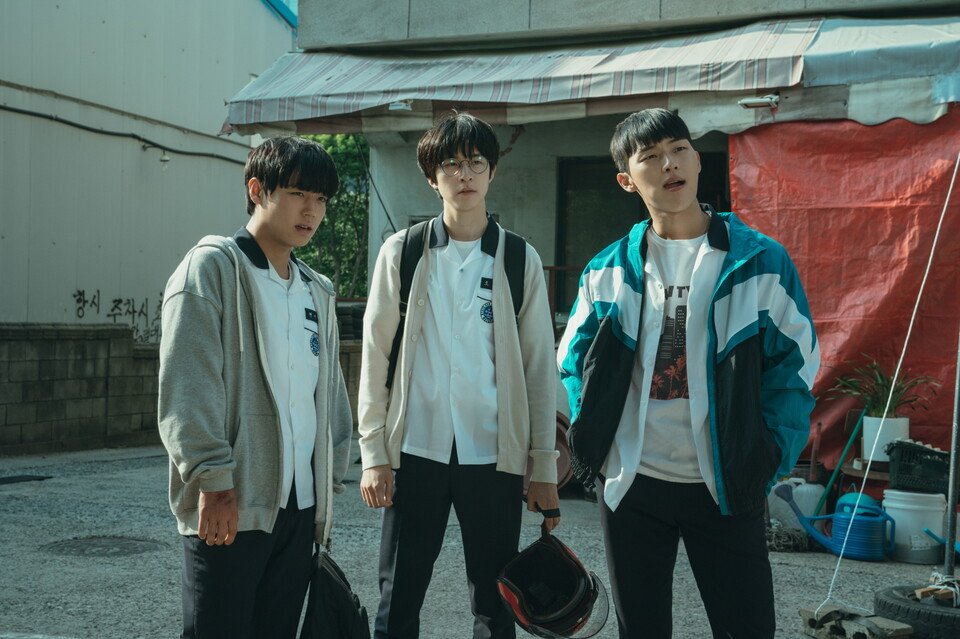📍 Weak Hero isn’t something you just consume once and forget—meeting and discussing with fans from around the world who want to remember this beautiful masterpiece for a long time brings joy beyond mere pleasure. Sometimes, a single thoughtful comment can completely change our existing approach to feeling and appreciating this exquisite poem of youth created by a young director and newcomers.
In this post, I’d like to share the heartfelt comment from a fan that arrived in my mailbox, almost like 🪽a poem. This fan’s analysis was so profound that I nearly teared up while reading it on the subway, and I had to quickly wipe away the teardrops with my sleeve before anyone noticed. This analysis of a different depth helped me understand the trio of Si-eun, Su-ho, and Beom-seok on an even deeper level.

📢 Fair Use Notice
This post contains copyrighted material from “Weak Hero” (© Wavve/Netflix) used for educational analysis, criticism, and commentary purposes under fair use doctrine. All rights belong to original creators.
The Deep Comment That Peered Into the Depths of Our Three Protagonists
I received this absolutely beautiful analysis from a subscriber that honestly moved me to tears while reading it during my morning commute. Let me share their words exactly as they wrote them:
People who are as deprived of affection, as Si-eun and Beom-seok are, will definitely have a flood of many emotions when someone they admire says or does something appreciative or kind or shows an honest interest in them.
Whether they realize it or not, they are totally needy. So, an offer of genuine friendship would bring forth tidal waves of disbelief, surprise, extreme gratitude, happiness, self-esteem, confidence, joy and … totally it’s love.
It’s that truly heady experience of first love. But it’s also a huge leap of faith for them to put their trust in it. It’s an enormous risk to accept and reciprocate it.
I mean, how can they fully trust a friendship when they’ve never really been awarded one before. They’ll be hyper-vigilant looking for evidence that it might not be real or that it’s going to be taken away. They’ll also be wondering how to pay for it … if all of their relationships have been transactional up to that point.
And the devastation that signs of rejection would bring? What’s the cost of rejection or loss when you’ve never had anything before and feel like you won’t have anything again.

I’m afraid it’s too difficult to figure out what kind of love this is. It’s too often difficult to figure out what any kind of love is.
But I know that Beom-seok was trying to figure out how to pay for it. He’s not strong. He’s not audaciously smart or brave like Si-eun is. But he does have money and position.
So, he’s deflated when his new friends don’t think he’s a hero for getting the money to pay Gil-soo (especially when the price of getting caught would be so extreme).
And then some street kid jumps in between them? How is she paying for Su-ho’s good graces? His real money isn’t good enough? And so he starts to really resent having to spend it on them. They’re taking it and him for granted, right? He doesn’t even have any clue how sexist and classist and insulting his thoughts are.
And he doesn’t care because he’s too desperate for Su-ho (and Si-eun’s) attention not to vanish. So, when he thinks it’s going, going … almost gone … he becomes a tornado of resentment and anger. He feels that he’s been betrayed.

Reading this analysis literally left me speechless. The way this subscriber articulated their thoughts felt almost lyrical, like discovering a hidden poem. Despite English not being my first language, somehow their words resonated so deeply it felt like they were speaking directly to my heart. This is exactly the kind of magic Weak Hero creates—forging profound connections that transcend cultural and linguistic boundaries.
You know, I’ve jokingly told other subscribers that this drama completely hijacked my entire month—that I can’t focus at work or even drink my morning coffee without thinking about this trio 😂 (As Gil-soo said, did the three musketeers disband? Yes, I was so captivated that I might have been hoping for the three musketeers to disband quickly)
I said I’m burning so intensely I might just turn to ash and disappear. But honestly? Reading this comment on my commute actually brought tears to my eyes.

This space we’ve created together has evolved into something far beyond just analysis videos. It feels like we’re nurturing something precious—viewers from every corner of the world who refuse to simply consume this story and move on. We want to keep it breathing, to rediscover those forgotten treasures of human experience:
authentic connection, unwavering loyalty, that fierce passion of youth when we’d give everything for someone we cherished without keeping score.

Understanding Beom-seok’s Currency of Love
This fan’s analysis perfectly captured what I had been struggling to express about Beom-seok’s psychology. She explained that Beom-seok was trying to figure out how to pay his own price for Su-ho and Si-eun’s friendship. Beom-seok isn’t strong, nor is he bold, smart, and brave like Si-eun. But this pitiful boy has money and status.
So when he sought money to give to Gil-soo, especially knowing that if caught by his ruthless adoptive father, he might face abuse severe enough to land him in the hospital… he becomes dejected when his beloved new friends reject that money.
(Of course, Su-ho and Si-eun are fundamentally different from Jeong-chan and Tae-hun. Jeong-chan and Tae-hun saw Beom-seok as a ‘money source’ while Su-ho and Si-eun truly regarded Beom-seok as a ‘friend’ If they were true friends, could they say ‘Thanks, we’ll use it well‘ to a friend who brought 15 million won?)

That scene where he puts the money in his bag and leads his two beloved friends to the science room—there’s this flash of confidence, even pride on his face.
People simply think Beom-seok exploded because of Instagram followers, but if you’re a true fan of this drama, someone who has tried to genuinely understand his complex and uncontrollable psychology, a fan who has deep affection for the character of Beom-seok, you can understand that the currency of ‘money’ means and symbolizes something much deeper for Beom-seok.
For Beom-seok, money wasn’t just money—it was his only currency.
Si-eun had courage, that “total lunatic” quality Su-ho loved. But for this other boy, there was only money, and money, beyond the concept of money itself, was a desperate attempt and the only means to hold onto the two friends who had given him the most ecstatic experience and sense of belonging in his life.
The Yeong-i Question and Beom-seok’s Tragic Assumptions
Many subscribers have asked me to analyze Yeong-i’s role, and this comment provided fascinating insight. The subscriber pointed out how Yeong-i forced Beom-seok to confront an impossible question:
She can’t fight like Si-eun, so how is this homeless girl earning Su-ho’s attention?
Another fan pointed out that Yeong-i is also ‘crazy’—in the sense of being brave—and mentioned that this was the aspect Su-ho found appealing about her. When Su-ho was hospitalized, he introduced Yeong-i to Si-eun, laughing as he called her ‘that girl who smashed a thug’s head.’ This shows that Su-ho is attracted to courage in others above all else.
(This supports the theory that Su-ho responds to courage above all else.)
But from Beom-seok’s perspective, this created an explosive realization. Here was a girl who had no money, no power, and couldn’t fight like the boys—yet she was still earning Su-ho’s attention and respect.
The sequence where Beom-seok kidnaps Yeong-i and interrogates her was the moment that completely revealed the dark assumption that had hardened into almost a certainty within Beom-seok. Beom-seok believes that instead of being indebted to Su-ho, Yeong-i, as a woman, must have given something back.

In fact, Yeong-i’s role in the drama was excellent—she served both as a helper to the protagonist Si-eun (without her courage, Si-eun couldn’t have found Gil-soo’s hideout) and as a catalyst that forced Beom-seok to confront the fundamental question that was deeply boiling in the boy’s dark room:
“What does she have that I don’t? Am I worth less than this street girl?”
The Misunderstanding About Taking Things for Granted
A fan raised an important point about whether Su-ho and Si-eun actually took Beom-seok for granted.
This subscriber is right. Su-ho and Si-eun took on the role of protectors in their group, and they saw Beom-seok as someone who needed protection since he lacked fighting skills and had a history of being bullied at school. After the stolen money (watch) incident, wasn’t it Su-ho who suggested calling out the school bullies who had severely tormented Beom-seok during his Mungang High days to get them to apologize to him? Si-eun also willingly went to the karaoke room for him.
But here’s the crucial psychological nuance:
Beom-seok begins to feel that his two friends, especially after Yeong-i appears, are taking for granted his ‘currency’ and the kindness formed through money. Walking behind Su-ho and Yeong-i side by side, harboring all kinds of suspicions and rising anger, having to pay for their coffee during weekend meetings that would have meant nothing under normal circumstances—these moments fanned the resentment that began to hazily rise in the boy’s dark room.

“Are you dating Ahn Su-ho? Well… that’s just how human relationships work… if there’s something you give, there’s something you receive… I was wondering what you gave to Ahn Su-ho…”
Another subscriber offered a interesting male perspective on these dynamics, particularly around Beom-seok’s psychology and Yeong-i’s role. They agreed that while Beom-seok’s “paying for love” made logical sense, emotionally it felt more complex.
Interestingly, they argued that Beom-seok wasn’t necessarily classist toward Yeong-i since he’d also been a stray, but rather displayed deep-rooted sexism in his assumptions about what she could offer Su-ho.
Another fan shared a refreshingly insightful perspective—from a masculine viewpoint, they interpreted the inclusion of Yeong-i as a girl in the drama’s development not as something that provokes jealousy or weakens the bromance, but as a natural reflection of teenage reality.
He pointed out how awkward CLASS 2 looks with so many teenage boys appearing, yet all the boys seem uninterested in sex, mentioning that having girlfriends is simply the normal flow of teenage life. The scene in Season 2 where Baku suggests to his friends that they go out to find dates actually felt like a real “bro code” to male viewers, supporting the idea that Yeong-i’s role was a realistic addition rather than a narrative device.
When “First Love” Transcends Categories
The Director’s decision to call Si-eun’s experience “first love” was brilliant precisely because it refuses simple categorization. For boys who’d lived in isolation their whole lives, Su-ho’s genuine friendship brought a tsunami of disbelief, surprise, gratitude, happiness, confidence, joy. The only word big enough for all that emotion is “love.”
Instead of trying to label their relationship as “romance” or “bromance,” we should sit with that incredible rush of raw emotion. What Si-eun and Su-ho shared was something deeper than categories—that pure, overwhelming connection that happens when someone truly sees you for the first time.

But here’s what really struck me about the subscriber’s analysis: they helped me realize that Su-ho wasn’t Si-eun’s only first love. In my view, Beom-seok was Si-eun’s first love too.
The Poetry of Broken Boys
When Su-ho grabs Beom-seok by the collar and pushes him at the karaoke room, the tension between the two boys reaches its peak. That scene where Beom-seok spits out “Are you showing off now? Should I give you your part-time job wages?”—this direction always makes a corner of my heart ache with a sharp pain.
Looking quietly at Su-ho’s hurt expression reminds us that even he, who always acted as the ‘older brother’ to Si-eun and Beom-seok, is ultimately just an ordinary seventeen-year-old boy who can easily crumble at the barbed words of a beloved friend, a trusted friend. Beom-seok knew exactly how painfully those words would pierce the friend he loved most.
Nevertheless, Beom-seok couldn’t fully understand the depth of what it meant for Su-ho—who was essentially a teenage breadwinner supporting his grandmother through various part-time jobs—to give up his part-time work and make time to help him, and how this was Su-ho’s own truthful way of showing great meaning, sacrifice, and friendship.
Beom-seok’s hatred had already grown too large, so he needed to hurt Su-ho with words first, before any physical violence.

Su-ho’s wounded expression is unforgettable. Beom-seok knew exactly how much those words would hurt.
The subscriber captured this perfectly when they wrote about the “tornado of resentment and anger” that comes when you feel betrayed by the first genuine connection you’ve ever experienced.
Both Si-eun and Beom-seok “lost something they couldn’t afford to lose—after having it for the first time, it’s just too great a loss and so they both kinda go ballistic.”
Choosing Growth Over Guilt
That’s why I want to celebrate Si-eun’s choice in that Season 2 ring scene—letting go of Beom-seok’s hand and choosing to wake up.

It was agonizing, but by releasing this boy in the black t-shirt, Si-eun chose growth over guilt, healing over holding on.
The beauty of that scene lies in its ambiguity. Whether Beom-seok was dead, alive, or a manifestation of Si-eun’s trauma doesn’t matter as much as what the moment represents—the need to process devastating loss and find ways to move forward.
Building Something Together
This comment reminded me why this channel has become something bigger than just analysis videos. We’re building something together—viewers from around the world who don’t want to just consume this drama and move on.
We want to keep it alive, to rediscover those things we’d forgotten: genuine human connection, real loyalty, that pure passion of youth when we’d sacrifice everything for someone we loved without keeping score.

Comments like this read like poetry and create magic across cultures and languages. They help us understand that these relationships work precisely because they refuse simple definitions. The drama captured both the beauty and tragic end of that euphoric first love experience at sixteen, seventeen—when emotions are too big for categories and love means everything and nothing all at once.
When we try to box these relationships into neat labels, we might miss the point entirely. Sometimes the most profound connections transcend the need for definition, existing in that beautiful, complicated space where friendship and love and obsession and loyalty all blur together into something that can only be called human.
📍 What resonates most with you about these complex relationships? Share your thoughts—these discussions keep these characters alive long after the final credits roll.
🔗 Related Posts by Character & Language
📚 Si-eun (시은) Analysis
English Posts
- Si-eun’s Episode 8 Revenge: Why the “Implausible” Critique Completely Misses the Point
- Why Si-eun is a Character Magnet: The Psychology Behind Weak Hero’s Most Compelling Relationships
- Si-eun’s Hidden Violence: An Exploration
- Si-eun’s Revenge Debate: Core Fan Comments Compilation
🥊 Su-ho (수호) Analysis
English Posts
- Su-ho’s Lost Comedy Gold: The Wordplay That Made Weak Hero Fans Fall in Love (But English Subtitles Missed Everything)
- The Untold Story of Su-ho and Beom-seok: Why Their Friendship Was Doomed from the Start
Korean Posts
💔 Beom-seok (범석) Analysis
English Posts
- When Dreams Become Prison: Analyzing Beom-seok’s Boxing Ring Appearance in Si-eun’s Dreams
- When Subscribers Become Psychology Experts: Two Brilliant Takes on Why Beom-seok Destroyed Su-ho in That Ring
- Beom-seok’s Obsession with Su-ho: The Tragic Psychology Behind Weak Hero’s Most Complex Relationship
⚡ Seong-je (성제) Analysis
English Posts
🤝 Character Dynamics
English Posts
- Su-ho and Si-eun’s Relationship: When Fans Ask the Hard Questions About Weak Hero’s Most Debated Bond
- Understanding Yeong-i: The Character Who Reveals Everything About Weak Hero’s Heart
- Was Yeong-i Added to Tone Down the Bromance? When Subscribers Drop Literary Masterpieces in My Comments
- Jun-tae’s Japanese Mystery and the Heartwarming Go-tak Friendship in Weak Hero Class 2
🎭 Behind-the-Scenes & Analysis
English Posts
- Weak Hero Class 1 Script Book: Behind-the-Scenes Secrets That Will Change How You See the Show
- Script Book vs Final Cut: The Dream Scene That Made Us All Cry
- The Complete Behind-the-Scenes Story of Weak Hero Class 1 – Answering Subscriber Questions
- Weak Hero Class Change Video Explanation: Actors Switching Roles
- Weak Hero Deleted Scene Delivery! Beuksan High’s #1 Taking Down Bullies
🌍 Fan Community & Cultural Analysis
English Posts
- Weak Hero Fans Are Going INSANE and I’m Here for It: The Comments That Broke My Brain
- The Joy of Global Connection: Discussing Weak Hero’s Most Complex Relationships with Fans Around the World
- When International Fans Decode Korean Bromance: Why Weak Hero Reads as BL Overseas
- Three Questions That Reveal Weak Hero’s Hidden Korean Realism
- Why These Three Friends Always Sit Together During Exams (And Other Translation Secrets)
Korean Posts
📊 Quick Navigation by Interest
⚡ Character Dynamics:
- Su-ho and Si-eun’s Relationship
- Beom-seok’s Obsession with Su-ho
- When International Fans Decode Korean Bromance
🧠 Psychology Deep Dives:
- When Subscribers Become Psychology Experts
- Si-eun’s Episode 8 Revenge
- Why Si-eun is a Character Magnet
🎬 Behind-the-Scenes Content:
🌐 Translation & Cultural Context:
⚠️ Site Policies & Legal Information
✅ About JennieKdrama.com: This blog provides personal fan analysis and reviews of K-dramas, focusing on school action series like ‘Weak Hero.’ All content represents personal opinions and interpretations from a fan perspective, unaffiliated with official production teams.
⛔️ Copyright Disclaimer: All drama footage, images, and references belong to their respective copyright holders, including streaming platforms and original creators. Materials are used minimally for educational criticism and analysis without intent of copyright infringement.
🚫 Privacy Policy: This site follows standard web policies and does not directly collect personal information beyond basic analytics for content improvement. Cookies may be used to enhance user experience and advertisements may be displayed.

답글 남기기